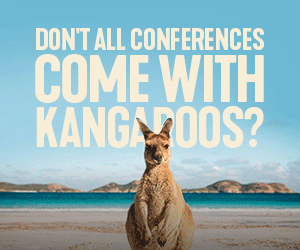Event Legacies: How Events Can Create a Long-lasting Impact?

All event planners want their events to be a success. Strong attendance numbers, stimulating sessions and panels, robust sponsorship programmes, and unique social programmes are just some of the benchmarks used to measure the performance of an event.
But what about beyond the actual event? When venues are vacated and everyone goes home? Are there ways in which the event can somehow “live on”? The short answer is yes. In shifting the mindset from exclusively organising a successful event to one that favours the idea of leaving a legacy, event planners can begin looking at ways for their event to offer a lasting contribution.
In this article, three World PCO Alliance partners share their views on the topic of event legacy, and some advice for event planners looking to embrace this new mindset.
First of all, let’s define legacy. Gregg Talley of Talley Management Group Inc. suggests that, in assessing the full value of an event, benefits must be delivered to all stakeholders: the attendees, the sponsoring organisation(s), exhibitors and sponsors, and the destination. If an event is intent on delivering benefits to all groups and stakeholders, then this becomes the “legacy” of that event.
Patranuch Sudasna of CDM Thailand defines legacy as a long-term positive impact to the industry, the host country, and beyond. She urges event planners to keep legacy in mind when planning an event. “Host organisations should think about what they will leave behind for the industry, its people and the next generation.”
Such a legacy can be in the form of an economic, business, professional, academic or community benefit. “Essentially,” says Sudasna, “legacy is something to increase impact for both host organisation and local stakeholders.”
Let’s address, for a moment, what a legacy is not. Many people confuse legacy with corporate social responsibility (CSR), and Talley says it’s important to understand and make the distinction. While CSR is a noble and important element that should exist in all events, it is not the equivalent of leaving a legacy. “CSR is usually some beneficial action or contribution to a local cause during an event in the local destination,” Talley points out. “Usually this is in the form of upgrading local schools and playgrounds or providing items or funds to a local charity. Legacy is something much longer lasting that aims to benefit the local population or institutions connected to the event’s purpose.”
Some examples of a legacy include an endowed chair in the event specialty at a local university, a scholarship programme for local students who are studying that specialty, or a tree planting project with participation and contribution of delegates. The project is tracked annually and participants receive regular updates. Simply put, it’s a benefit with a long-lasting impact on a specific group tied to the overall mission, specialty or theme of an event.
Event legacy is still a relatively new concept, and many event planners and associations require some support in how to incorporate this goal in their overall event strategy. Moreover, a key component of this strategy lies with the host city/destination. Says Talley, “It is usually easier when destinations pursue an ‘alignment strategy’ in their event marketing and sales strategy. When they align sales to their unique economic development goals, key economic sectors, and knowledge hubs, there can be an easier confluence of interests in identifying and collaborating on a relevant, meaningful legacy.”
Sudasna also underlines the importance of local stakeholders in creating a legacy. She recommends that event organisers, through the host country’s convention bureau, reach out to local stakeholders to set meeting legacy goals and activities to contribute to those goals as well as determine ways of measuring the outcome. Says Sudasna, “It’s vital to find and share the values and objectives between the host organisation and the host country. Collaboration of all sectors is crucial to produce innovative meetings which serve the community, the environment, and the future.”
Sudasna offers these tips for identifying legacy goals:
- Invite local institutions, the convention bureau and the host city to be involved from the early stages of planning an event;
- Encourage collaboration among the local stakeholders so they feel they are an active part of the organisation of the event;
- Identify types of activities which resonate with their society. Then, contact notable non-profit groups.
Thania Carrera of T&C Group adds: “Teamwork is then essential between suppliers, the PCO and the client or association; all must have the same goal to ensure a legacy that will resonate with succeeding generations and enhance the association’s brand image.”
Event legacies can generate significant long-term impact. Take the ESTRO 2021 meeting in Madrid, for example, which ensured that every hospital in Spain received radiology equipment. The ICCA/Best Cities Impact Awards recognise other standout contributions.
While these examples are certainly inspiring, an event planner needs to keep a few things in mind when considering the legacy they wish for their event:
- Don’t make any decisions in a vacuum. As mentioned earlier, establishing a legacy requires an alignment from all stakeholders;
- Don’t overcommit: Make sure the goal is laudable but also feasible;
- Don’t confuse legacy with corporate social responsibility: Incorporating sustainable practices into an event is not the same thing as an event legacy.
In selecting a legacy, budgetary constraints often come into the picture, but Carrera doesn’t think such limitations need be a reason for excluding a legacy. “Although budget can be an issue, various types of legacies can be realised that are all meaningful for association members, participants and the community in the destination.”
Professional conference organisers, or PCOs, play an important role in helping their clients determine appropriate legacy goals and facilitating the dialogue between the host organisation and the host country, which is so critical to any legacy’s success.
The fundamental question an event planner must ask themselves is, how can we leave a positive impact on the local destination that reinforces our mission and event outcomes?
While pursuing a legacy may seem complicated, Talley and Sudasna both acknowledge its importance. Host organisations should start identifying meeting legacy goals in the early planning stages of an event and reach out to local stakeholders to explore those goals and ideas.
Sudasna concludes: “Whatever your sector, whatever field or specialty concerns your event, each of us has a role to play, and we should be engaged in contributing towards a better future for us all.”
Other Articles
About Us
Supported by the Union of International Associations (UIA), the International Association of Professional Congress Organisers (IAPCO) and the Interel Group, the global public affairs and association management consultancy, Headquarters Magazines serve the needs of international associations organising worldwide congresses.















